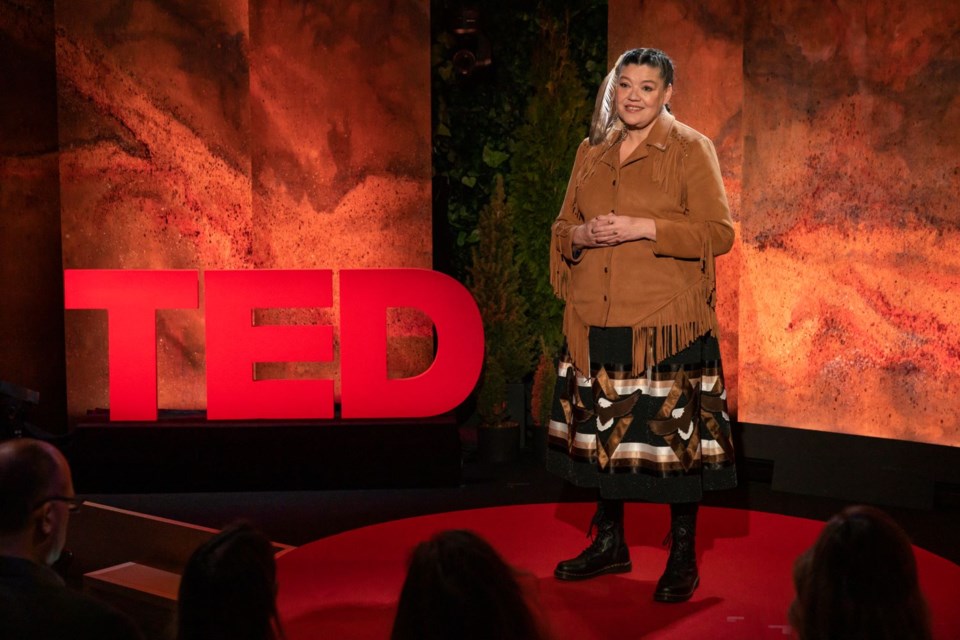Scott Hayes | [email protected]
Local Journalism Initiative Reporter
While Matricia Bauer has always held a crowd’s attention during her many events as part of , being the focus of a television show and a TED Talk are entirely new experiences.
These are important moments for her, and she hopes they are for everyone else as well.
“I have to be able to do my part in the ability that I have as an Indigenous woman to tell my story so that other people can then feel safe to share their story,” she said.
“Really, my TED Talk isn't meant for the masses. It's really meant for those other Indigenous women that are coming of age and they see another woman wearing an eagle feather, wearing fringe, wearing a ribbon skirt, being brave and telling their story even though it's hard. If that helps them be brave and share their story, then we have a lot of people who are sharing their truth and then we can achieve, eventually, reconciliation when other people understand the truth.”
Her TED Talk called “I am Eagle” is about the power of connecting with your identity, . These talks are typically meant to feature an expert offering an informative presentation that focuses on one message for the audience to identify with and take away. They are life lessons, not people’s stories.
Bauer’s presentation, however, was a little different. They wanted her to tell her story, and it’s a powerful one at that.
It starts with her talking about her dreams of speaking Nêhiyawêwin, the language of her ancestors, but in her waking life, she can only speak English. The story relates how she was one of the more than 20,000 children taken from their families during the Sixties Scoop and the intergenerational trauma that also worked to define her history.
These are painful truths. All truths must be faced and accepted, she said, especially the painful ones.
“Really, it comes down to how when we talk about truth and reconciliation, we often jump over the truth part of things. For me, I think people need to know who I am as a person. They need to know the truth of my story. I only have one story: it's my own so that's the one that I can share. If people can hear my story and connect with it, then we can move to reconciliation, because now reconciliation is a relationship.”
This is not something she undertook lightly. It took months of work and planning.
“It's hard to talk about your trauma. It's hard to talk about different parts of my family. Things have happened, and it's hard to talk about everybody being separated, people passing away. These traumatic events like the Sixties Scoop and residential schools are things that defined basically my history, and then to share it with the world, it was really a brave act.”
She said that it was a challenge to craft the presentation in a way that would be relevant to people of all backgrounds, not just Indigenous. She wrote it to focus on helping everyone understand what it’s like to be separated from your family and your culture and how it can affect your life. She also talks about the healing lifelong process of finding herself and her culture again.
The recent release of the TED Talk, filmed months ago, coincides with the premiere of the second season of (the Aboriginal Peoples Television Network) on Saturday, May 27. The full season features Bauer doing a Wapakwanis plant walk followed by some time in the kitchen to make traditional Indigenous foods, drinks and medicines.
The nine episodes were filmed over the span of a week last summer.
“It follows a typical day for me where I do a plant walk, and then I forage and then I make something out of it. In this case, we did a mocktail and food. I did it over an open flame, and then I did a fireside chat explaining that particular foraging experience. For instance, if I was collecting strawberries, then I would make a strawberry mocktail. I would make a strawberry pie, and then I would talk about the strawberry and Indigenous way. It's called O-day'min. It's the story of first man and first woman.”
It’s a beautiful story too, and it makes sense especially if you cut a strawberry in half from top to bottom. It’s better to listen to her tell it.
Though there’s no worry about letting fame get to her head, the Wapakwanis is her way of staying grounded and connected with what’s happening and what’s real. She can’t tell you if Back to Roots and the TED Talk, or even her past appearance on APTN’s (where she pitched her ) are the start of a new career.
What she can tell you about though are the seasons of poplar buds, spruce tips, rosebuds, strawberries and sage.
“It also keeps me in the cycle of what's happening. I can see things coming and evolving. It's nice to be able to see what will be next.”




